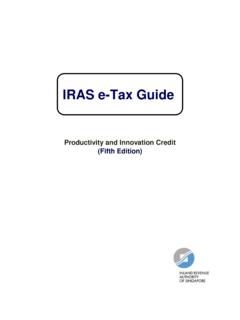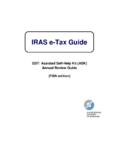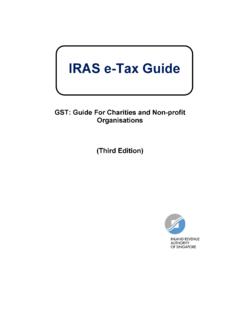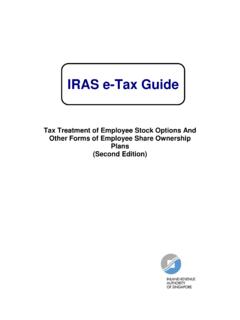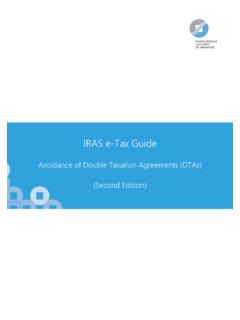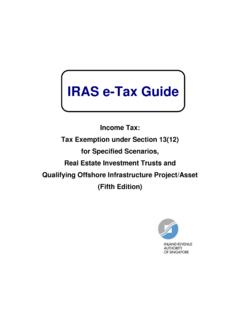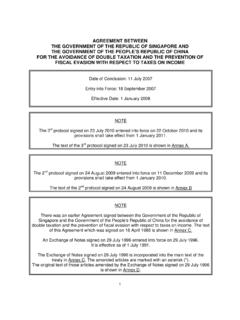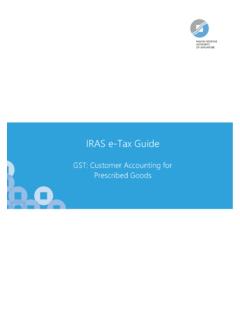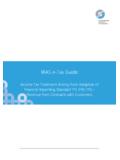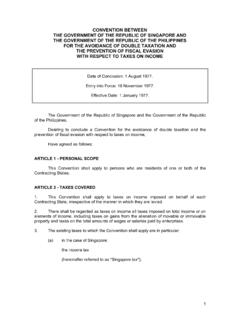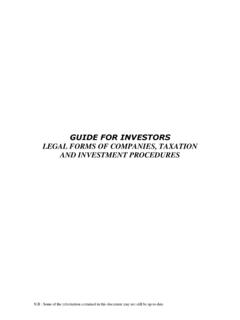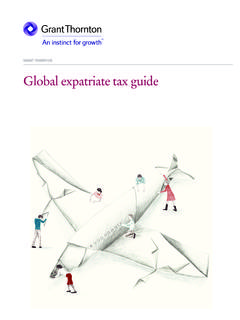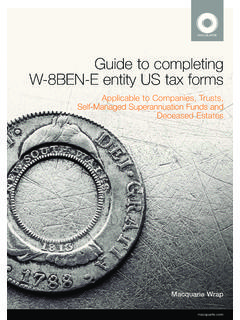Transcription of IRAS e-Tax Guide
1 iras e-Tax Guide Tax Exemption for foreign -Sourced Income (Second edition). Published by Inland Revenue Authority of Singapore Published on 31 May 2013. First edition on 6 Sep 2011. Disclaimers iras shall not be responsible or held accountable in any way for any damage, loss or expense whatsoever, arising directly or indirectly from any inaccuracy or incompleteness in the Contents of this e-Tax Guide , or errors or omissions in the transmission of the Contents. iras shall not be responsible or held accountable in any way for any decision made or action taken by you or any third party in reliance upon the Contents in this e-Tax Guide . This information aims to provide a better general understanding of taxpayers' tax obligations and is not intended to comprehensively address all possible tax issues that may arise. While every effort has been made to ensure that this information is consistent with existing law and practice, should there be any changes, iras .
2 Reserves the right to vary our position accordingly. Inland Revenue Authority of Singapore All rights reserved. No part of this publication may be reproduced or transmitted in any form or by any means, including photocopying and recording without the written permission of the copyright holder, application for which should be addressed to the publisher. Such written permission must also be obtained before any part of this publication is stored in a retrieval system of any nature. 1. Table of Contents Page 1 Aim ..3. 2 At a 3 Glossary ..5. 4 Background ..6. 5 FSIE scheme ..6. 6 Scope of specified foreign 7 foreign -sourced income received in Singapore ..8. 8 Qualifying conditions ..8. 9 Administrative procedures ..12. 10 Contact 11 Updates and Annex A Examples of a fixed place of operation ..14. Annex B Illustration on whether tax is paid or payable in a foreign country ..15. 2. Tax exemption for foreign sourced income 1 Aim This e-Tax Guide provides details on the tax exemption for certain foreign -sourced income from 1 Jun 2003 under the foreign -sourced income exemption (FSIE) scheme.
3 This e-Tax Guide consolidates the three e-Tax guides issued previously 1 on the FSIE scheme. It applies to all Singapore tax resident persons receiving foreign - sourced income in Singapore. 2 At a glance Under the FSIE scheme, specified resident taxpayers who receive: a. foreign -sourced dividends;. b. foreign branch profits; or c. foreign -sourced service income from 1 Jun 2003 would be given tax exemption if they meet these qualifying conditions: a. Subject to tax;. b. foreign headline tax rate of at least 15%; and c. Beneficial tax exemption From 1 Jan 2004, all foreign -sourced income received in Singapore by resident individuals, except those received through a Singapore partnership, will be exempt from tax where the Comptroller is satisfied that the exemption will be beneficial to them. The FSIE scheme is summarised in the following table: Period of Remittance 1/6/2003 to 1/1/2004 to 22/1/2009 to 22/1/2010.
4 31/12/2003 21/1/2009 21/1/2010 and after Resident Specified individuals foreign income All foreign -sourced income tax exempt under (income tax exempt S13(7A)* subject to the beneficial tax exemption . received not under S13(8)* condition through a subject to partnership in qualifying Singapore) conditions 1. iras circulars on tax exemption for foreign -sourced dividends, foreign branch profits and foreign -sourced service income: Main circular published on 21 May 2003. Two supplementary published on 30 Jul 2004 and 31 May 2006. 3. Period of Remittance 1/6/2003 to 1/1/2004 to 22/1/2009 to 22/1/2010. 31/12/2003 21/1/2009 21/1/2010 and after Resident All foreign -sourced individuals income accrued (income Specified before 22 Jan 2009. received foreign tax exempt under through a income tax Specified foreign income tax S13 (8A)*. All partnership in exempt under exempt under S13(8)* subject qualifying Singapore) S13(8)*.
5 To qualifying conditions conditions lifted subject to Resident except the qualifying persons other beneficial tax conditions than exemption . individuals condition. **. * Sections of the Income Tax Act (ITA). ** For further details, please refer to the e-Tax Guide on Temporary Liberalisation of Income Tax Exemption for foreign -Sourced Income Received in Singapore from 22 Jan 2009 to 21 Jan 2010 issued on 20 Feb 2009. 4. 3 Glossary foreign -sourced Income foreign income that does not arise from a trade or business carried on in Singapore. Person Under section 2 of the Income Tax Act (ITA), a person includes a company, body of persons and a Hindu Joint Family. Specified foreign income The specified foreign incomes are: a. foreign -sourced dividend, b. foreign branch profits, c. foreign -sourced service income. Specified resident taxpayer The specified resident taxpayers are: Period Specified Resident Taxpayers 1 Jun 2003 to 31 Dec 2003 All persons resident in Singapore From 1 Jan 2004 a.
6 Resident persons other than individuals;. and b. Resident individuals receiving the specified foreign income through a partnership in Singapore 5. 4 Background Prior to 1 Jun 2003, resident taxpayers would be taxed on all foreign - sourced income received in Singapore, unless they are tax-exempt 2. They may also be taxed on the same foreign -sourced income in the foreign countries. To relieve from double taxation, they may claim the following tax credits: a. Unilateral tax credit under Section 50A of the ITA for income remitted from countries with which Singapore does not have a Double Taxation Agreement (DTA);. b. Double Taxation Relief under Section 50 of the ITA for income remitted from countries with which Singapore has a DTA ; or c. Commonwealth Tax Relief under Section 48 of the ITA for income remitted from the Commonwealth countries. This section was repealed with effect from Year of Assessment 2010.
7 To enhance Singapore's attractiveness as a business hub and to boost our services export, it was announced in Budget 2003 and 2004 that tax exemption may be given to certain foreign -sourced income. 5 FSIE scheme The FSIE scheme is provided under Sections 13 (7A) to 13 (11) of the ITA. Specified foreign income received in Singapore on or after 1 Jun 2003. by specified resident taxpayers will be exempt from tax where the qualifying conditions are met. The conditions are elaborated in paragraph 8. The tax treatment as described under paragraph will continue to apply where the qualifying conditions are not met. The tax exemption applies to specified foreign income that does not arise from a trade or business carried on in Singapore. Where the foreign income arises from a trade or business carried on in Singapore, it remains taxable in Singapore upon accrual regardless of whether it is received in Singapore.
8 2. Tax exempt under an approval granted by the Minister for Finance or under a tax incentive granted under ITA / Economic Expansion Incentives (Reliefs from Income Tax) Act. 6. 6 Scope of specified foreign income foreign -sourced dividend For the purposes of the tax exemption, a dividend is a foreign -sourced dividend if it is paid by a non-Singapore tax resident company. This treatment also applies to foreign dividend, which may be the income of a trade or business carried on in Singapore by a specified resident taxpayer ( dividends received by a bank tax resident in Singapore). In addition, there is no shareholding requirement to enjoy the tax exemption. foreign branch profit A foreign branch is a business operation of a Singapore company registered as a branch in a foreign country. foreign branch profits are profits from a trade or business carried on outside Singapore by the foreign branch.
9 It excludes non-trade or non-business income of the foreign branch. foreign -sourced service income Service income refers to income from professional, technical, consultancy or other services provided by a specified resident taxpayer in the course of its trade, profession or business. Such service income is considered foreign -sourced if the services are provided through a fixed place of operation in a foreign country. If the services are not provided through a fixed place of operation in a foreign country, the service income will be considered Singapore-sourced even though: a. The income is derived from services rendered outside Singapore;. and b. Tax is payable in that foreign country in accordance with the provisions of a DTA with the foreign country. A fixed place of operation refers to a place of management, an office or some floor space where the specified resident taxpayer or its employees provide the services.
10 A place of operation is considered a fixed place of operation if: a. It has features of permanence. This is a question of fact. b. It is at the disposal of the specified resident taxpayer on an on- going basis. The mere presence of the specified resident taxpayer in a particular location does not necessarily mean that the place is at its disposal. For example, a taxpayer visits a major customer's premises regularly to render audit services. This does not mean the premises are at the taxpayer's disposal for the purpose of its trade, profession or business. Thus, they do not constitute a fixed place of operation. 7. c. The specified resident taxpayer uses it regularly to carry on its trade, business or profession of providing services. d. The specified resident taxpayer does not use it to perform only auxiliary or preparatory activities Please refer to Annex A for some examples on whether a place of operation is considered a fixed place of operation.
